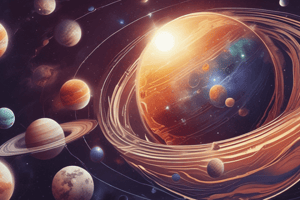Podcast
Questions and Answers
Which planet is known for its prominent ring system?
Which planet is known for its prominent ring system?
- Neptune
- Jupiter
- Uranus
- Saturn (correct)
What is the primary component of the atmospheres of Venus and Mars?
What is the primary component of the atmospheres of Venus and Mars?
carbon dioxide
The planet ___________ has the tallest volcano in the solar system.
The planet ___________ has the tallest volcano in the solar system.
Mars
Pluto is still considered the ninth planet in the solar system.
Pluto is still considered the ninth planet in the solar system.
Study Notes
Planets of the Solar System
Terrestrial Planets
- Mercury
- Closest planet to the Sun
- Smallest planet in the solar system
- Highly elliptical orbit
- Venus
- Hottest planet in the solar system
- Thick atmosphere composed of carbon dioxide
- No moons
- Earth
- Only known planet to support life
- 71% of surface is water
- One large moon
- Mars
- Known as the Red Planet due to iron oxide in soil
- Has the tallest volcano in the solar system (Olympus Mons)
- Has polar ice caps
Jovian Planets
- Jupiter
- Largest planet in the solar system
- Composed mostly of hydrogen and helium
- Has a massive storm known as the Great Red Spot
- Has a system of 79 known moons
- Saturn
- Known for its prominent ring system
- Composed mostly of hydrogen and helium
- Has at least 62 moons
- Uranus
- Tilted axis results in extreme seasons
- Composed mostly of hydrogen, helium, and methane
- Has a system of 27 known moons
- Neptune
- Farthest planet from the Sun
- Composed mostly of hydrogen, helium, and methane
- Has a system of 14 known moons
Dwarf Planets
- Pluto
- Once considered the ninth planet in the solar system
- Now classified as a dwarf planet
- Has a highly eccentric orbit
- Eris
- Located in the Kuiper Belt
- Slightly larger than Pluto
- Has a highly eccentric orbit
Planets of the Solar System
Terrestrial Planets
- Mercury is the closest planet to the Sun and has a highly elliptical orbit.
- It is also the smallest planet in the solar system.
- Venus is the hottest planet in the solar system, with a thick atmosphere composed of carbon dioxide and no moons.
- Earth is the only known planet to support life, with 71% of its surface covered in water and one large moon.
- Mars is known as the Red Planet due to the presence of iron oxide in its soil, and has the tallest volcano in the solar system, Olympus Mons, and polar ice caps.
Jovian Planets
- Jupiter is the largest planet in the solar system, composed mostly of hydrogen and helium, and has a massive storm known as the Great Red Spot.
- It also has a system of 79 known moons.
- Saturn is known for its prominent ring system, composed mostly of hydrogen and helium, and has at least 62 moons.
- Uranus has a tilted axis, resulting in extreme seasons, and is composed mostly of hydrogen, helium, and methane, with a system of 27 known moons.
- Neptune is the farthest planet from the Sun, composed mostly of hydrogen, helium, and methane, and has a system of 14 known moons.
Dwarf Planets
- Pluto was once considered the ninth planet in the solar system, but is now classified as a dwarf planet, with a highly eccentric orbit.
- Eris, located in the Kuiper Belt, is slightly larger than Pluto and has a highly eccentric orbit.
Studying That Suits You
Use AI to generate personalized quizzes and flashcards to suit your learning preferences.
Description
Explore the characteristics of the four terrestrial planets in our solar system, including Mercury, Venus, Earth, and Mars. Learn about their unique features, such as their orbits, atmospheres, and moons.




